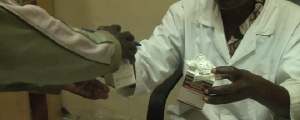An upsurge of malaria and diarrhoea cases has been reported in several villages in the Greater Pibor Administrative Area (GPAA), with hard-hit facilities reeling under a biting shortage of drugs.
Dr. Abdelrobu Mohammed, Director of the Primary Health Care Department in the area, told Radio Tamazuj on Monday that they record over 800 cases of malaria and diarrhoea weekly in some parts of the area, amid shortages of medicines.
“Our health situation in the Greater Pibor area is dire. This health crisis was created by inter-communal conflicts and floods. Starting from Manyirany moving on to Likuangole, all the surrounding villages recorded a spike in cases of malaria and diarrhoea over the past two weeks. On a weekly basis, we receive about 800 patients,” Mohammed explained.
The health official decried the current health situation in the area and called for urgent intervention. He said the health situation will worsen in the coming weeks when the rains start.
Lokali Amae, a lawmaker representing Pibor County in the GPAA Legislative Council, said the health situation is deteriorating in the area because the civil population lacks access to basic services.
“The situation in Pibor is very dire. The only health agency which has been operating there has shifted to the Jebel Boma area so now people are really suffering,” he said.
For his part, Peter Kuju, the GPAA’s Director of Health, appealed to the national government and health agencies operating in the country to provide health care services, saying last year’s floods and communal clashes worsened the situation.
South Sudan’s health care system is facing challenges due to the low budgets allocated to the health sector by the government. International organizations are now the major providers of healthcare in the country.
Source: radiotamazuj.org
 Home Of Ghana News Ghana News, Entertainment And More
Home Of Ghana News Ghana News, Entertainment And More





